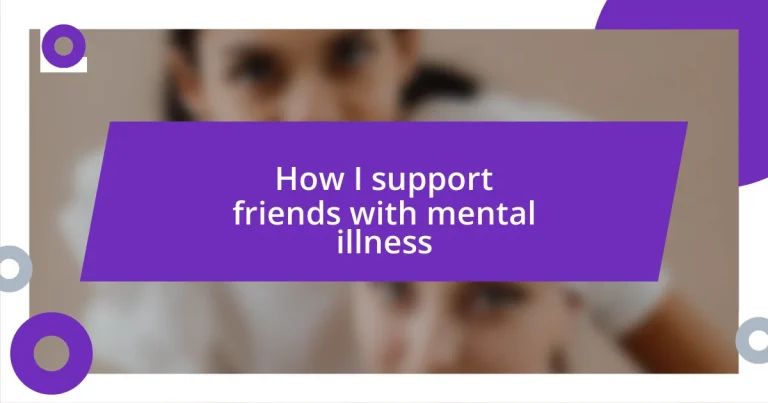Key takeaways:
- Empathy and active listening are crucial when supporting friends with mental health challenges, creating a safe space for open dialogue.
- Recognizing signs of mental illness, such as behavioral and physical changes, allows friends to connect and offer meaningful support.
- Maintaining personal mental health through boundaries and self-care is essential for effectively supporting others.
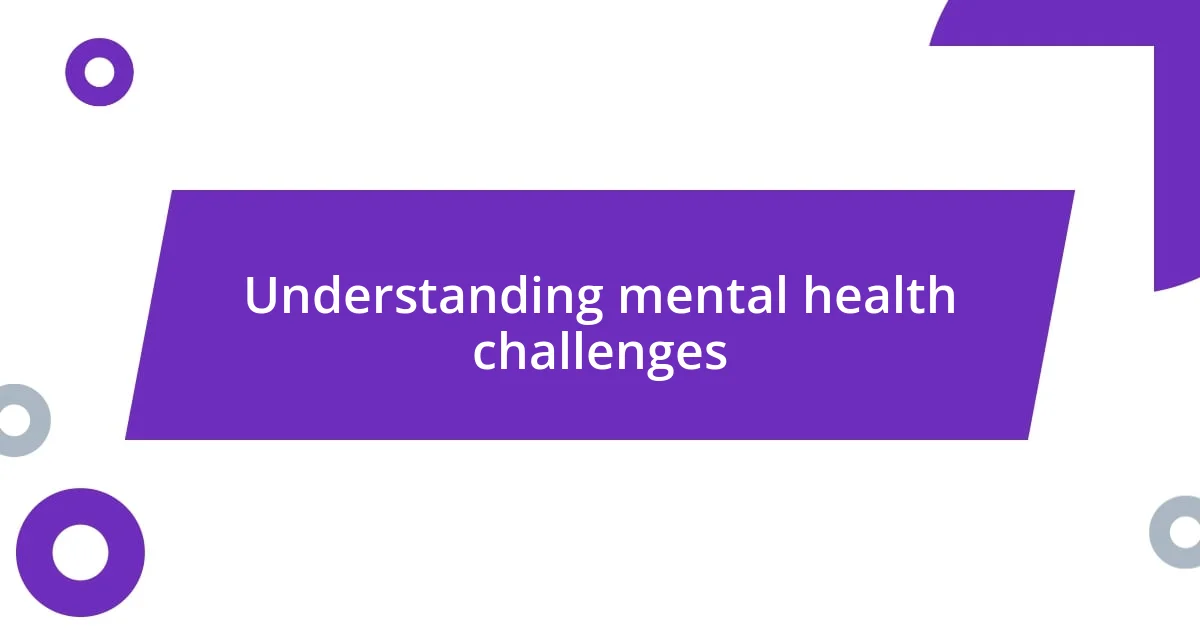
Understanding mental health challenges
Understanding mental health challenges requires a deep dive into the complexities of the human experience. Each mental health struggle is unique, shaped by personal history and circumstances. I’ve had moments where I saw a friend grappling with anxiety, often freezing under pressure. Seeing him fight that invisible battle made me realize just how isolating mental health issues can be.
Sometimes, I wonder if we fully grasp the weight of mental health challenges. When a friend shares their feelings of hopelessness, it can be tempting to offer quick solutions. However, I’ve learned that empathy often speaks louder than words. I vividly recall a time when I simply sat in silence with a close friend, who was facing depression. That quiet understanding created a safe space for her to express herself without fear of judgment.
Despite growing awareness, misconceptions about mental health persist, often leading to stigma. I remember feeling unsure when a friend revealed his struggles with bipolar disorder. Initially, I found myself searching for the right thing to say. But as I educated myself, I realized that just being there was what mattered most. Conversations can be a powerful tool for promoting understanding—what barriers have you seen in discussing mental health?
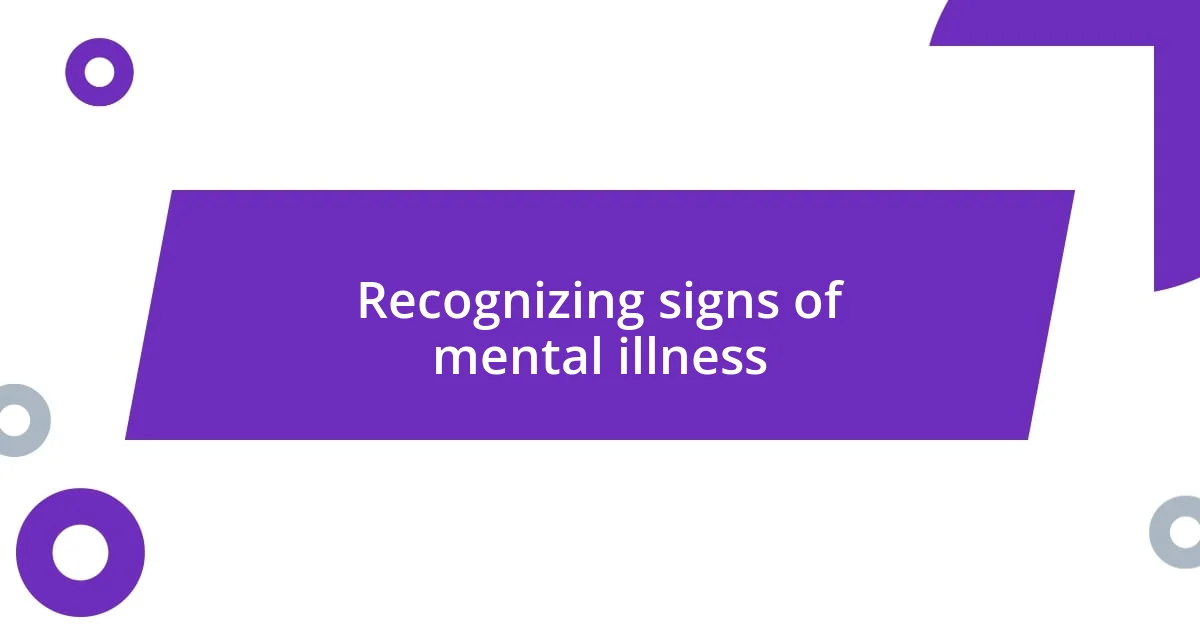
Recognizing signs of mental illness
Recognizing the signs of mental illness can be challenging, but it’s essential for providing support. For instance, I remember a time when a friend who was usually energetic became withdrawn. Her sudden lack of interest in activities she loved, like painting and hiking, prompted me to ask if everything was okay. This experience helped me connect the dots—changes in behavior can be red flags.
Another sign I’ve learned to look for is changes in sleeping or eating habits. One of my close friends started sleeping excessively and mentioned feeling fatigued all the time. At first, I thought she was just busy with work. However, after a gentle conversation, she opened up about her anxiety. It became clear that mental health can manifest in physical ways.
I think it’s also important to pay attention to emotional language. When friends express feelings of worthlessness or persistent sadness, it can indicate deeper struggles. I once heard another friend say he felt like he was a burden to everyone. That statement sparked a conversation about his feelings of depression, helping him realize he wasn’t alone. Awareness of these signs creates an opportunity for connection and understanding.
| Signs of Mental Illness | Examples |
|---|---|
| Behavioral Changes | Withdrawal from activities and social interactions |
| Physical Changes | Changes in sleep or appetite |
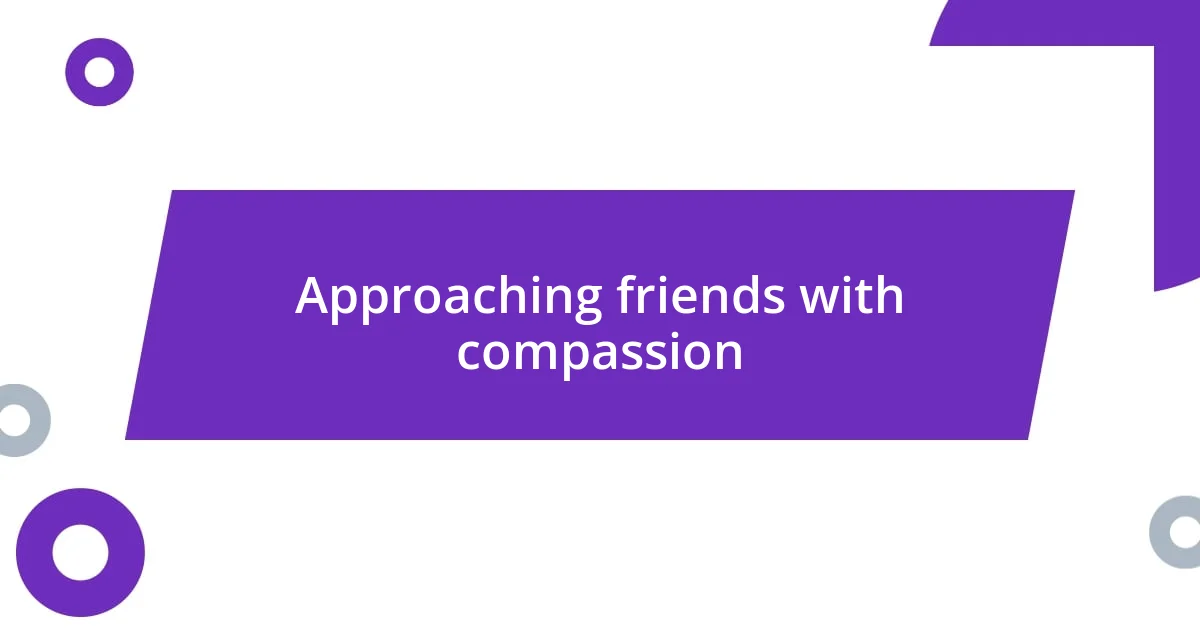
Approaching friends with compassion
When approaching friends with compassion, I’ve found that it’s crucial to set aside my preconceived notions and truly listen. A few months ago, a friend reached out, feeling overwhelmed with her workload and personal issues. Instead of jumping in with advice, I let her share her thoughts, creating a space where she felt comfortable to open up. This taught me that sometimes simply being present can mean the world.
- Practice active listening: Show you care by really paying attention and validating their feelings.
- Use open body language: Non-verbal cues, like nodding and maintaining eye contact, can convey support.
- Avoid judgment: Reassure them that it’s okay to express their struggles without fear of being criticized.
- Follow up: Check in later to show you’re still thinking about them and their well-being.
Compassion also means respecting their boundaries. I recall a time when a friend was battling severe anxiety, and I could sense his discomfort when I brought up mental health. Instead of pushing the topic, I shifted our conversation to something lighter, allowing him to engage at his comfort level. This experience reinforced my belief that support is about meeting friends where they are.
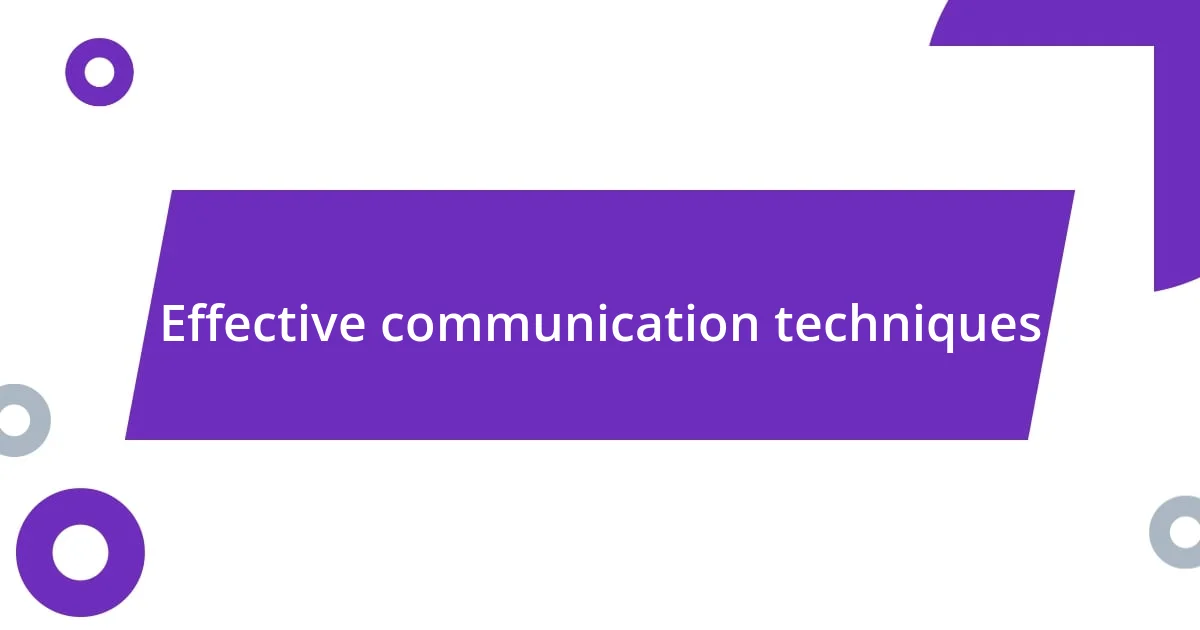
Effective communication techniques
Maintaining effective communication with friends who are struggling can be quite rewarding yet challenging. I’ve realized that sometimes, asking open-ended questions can lead to deeper conversations. I remember an afternoon when I simply asked a friend, “What’s been on your mind lately?” The floodgates opened, and she began to unravel her feelings about her anxiety. It was a beautiful reminder that showing genuine interest can make a world of difference.
Being mindful of tone and wording is crucial too. There was an instance where I said, “I know what you’re going through,” but my friend felt invalidated because, quite frankly, I didn’t know his full struggle. From that moment, I learned to share my willingness to understand instead of making assumptions. Phrasing statements like, “I’m here to listen if you want to share” nurtures a safe space for dialogue without pressure.
Sometimes, silence speaks volumes. A few weeks ago, I found myself sitting beside a friend who was grappling with overwhelming fatigue. I didn’t feel the need to fill the space with words; I just sat with him. In that moment, it was clear he didn’t need consolation or advice—just a friend beside him. Have you ever experienced that comforting silence with someone? It solidified for me that communication isn’t only about words; sometimes, it’s about being present.
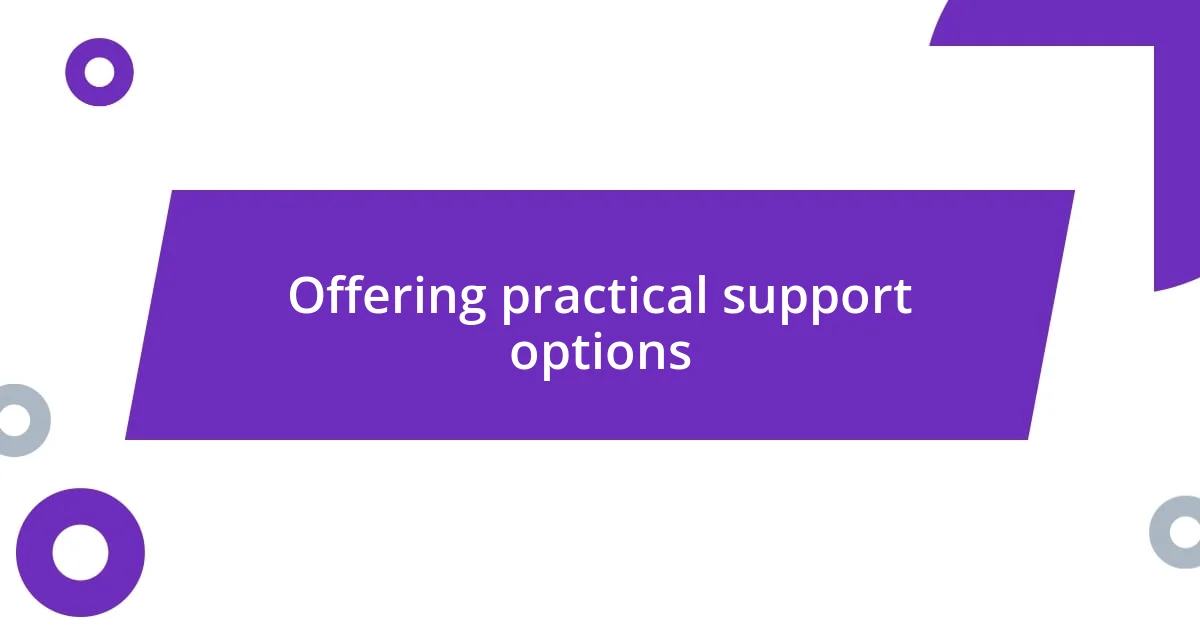
Offering practical support options
One of the most practical ways I’ve found to support friends is by offering tangible help. There was a time when a friend was juggling work while dealing with depression. I decided to step in and assist with her grocery shopping. It was a small gesture, but it relieved some pressure and let her focus on her mental health instead. Have you ever noticed how small acts can make a significant difference?
Creating a routine can also provide much-needed structure. I remember when a buddy of mine struggled with motivation during a tough period. We set up weekly check-in calls, which transformed his week. It was as simple as sharing our goals, but having that accountability lifted his spirits. Sometimes, just knowing someone is there to support our intentions can be deeply encouraging.
Another impactful method is to educate myself on his specific condition. I’ve taken the time to read about anxiety and the challenges that come with it. This not only enhances my understanding but allows me to be better equipped to offer relevant support. When my friend faced a panic attack, I felt more prepared to help, having learned techniques to help ground him. Don’t you think taking the time to understand someone’s struggles can create a deeper bond?
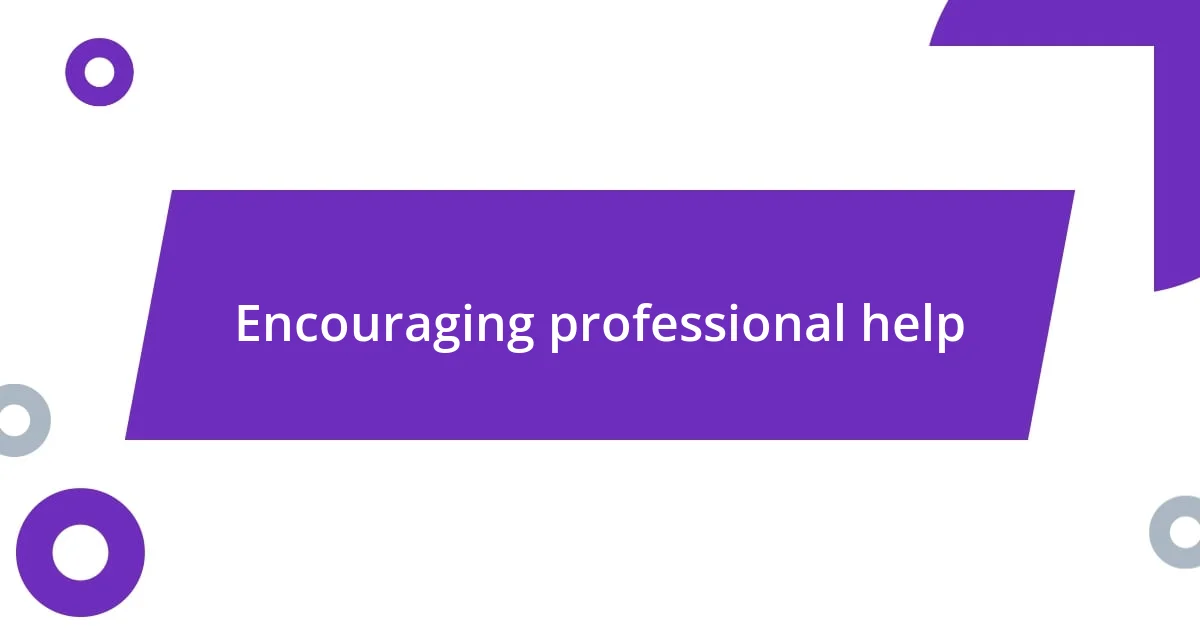
Encouraging professional help
Encouraging friends to seek professional help can feel a bit daunting, but it often leads to transformative change. I vividly remember suggesting therapy to a close friend who was battling severe anxiety. Initially, he hesitated, fearing stigma and uncertainty about what to expect. However, after sharing my own positive experience with counseling, he decided to give it a try—and seeing him gradually find his voice and reclaim parts of himself was incredibly rewarding.
Sometimes, it’s about framing the conversation in a way that feels safe and supportive. When I felt the need to nudge another friend toward seeking help, I approached it gently. I said, “You know, talking to someone who really understands this stuff can help. It’s like having a dedicated coach for your mind!” That little shift in perspective made a difference; he opened up and ended up scheduling an appointment. Have you noticed how the right words can reshape someone’s thoughts about getting help?
Moreover, offering to help with the logistics can ease the burden of taking that first step. I recently helped a friend pick a therapist and even went as far as to research a few options with him. It made the process feel less overwhelming, turning an intimidating task into something manageable. Sometimes, just knowing someone is beside you, cheering you on, can be the nudge a friend needs to prioritize their mental health. The journey toward healing doesn’t have to be walked alone, right?
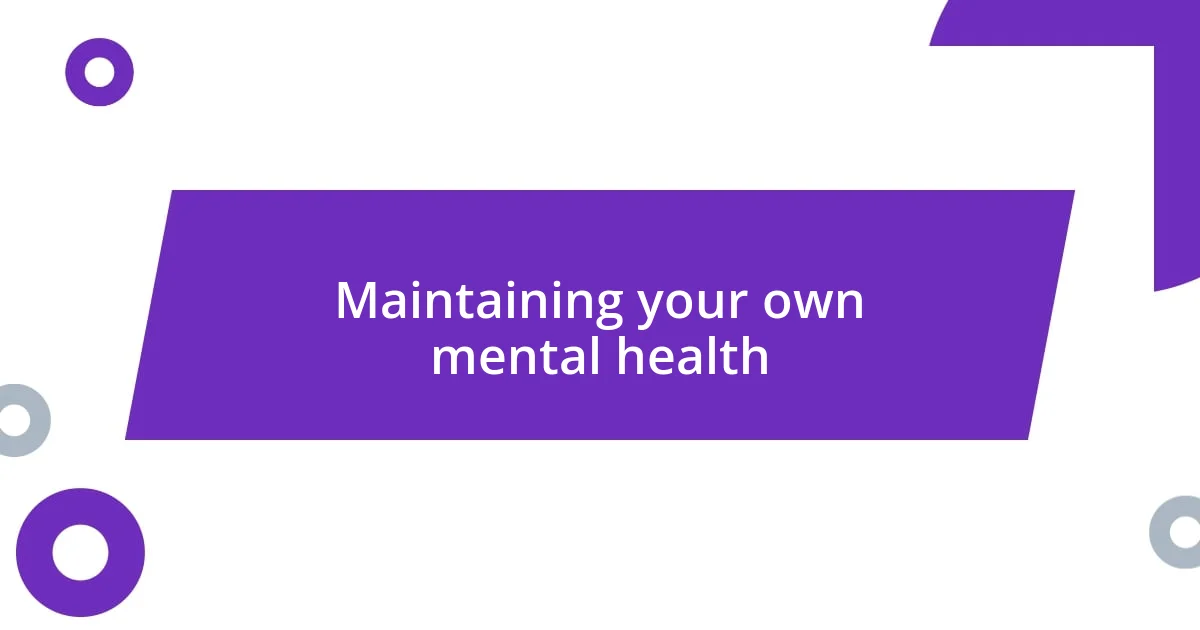
Maintaining your own mental health
Maintaining my own mental health while supporting friends can often feel like walking a tightrope. I remember a time when I went through a particularly challenging phase, juggling my own anxieties while trying to be there for a friend in crisis. I realized that by neglecting my own needs, I wasn’t as effective in my support. Have you ever noticed how your own well-being reflects on your ability to help others?
One strategy that has worked wonders for me is setting clear boundaries. I learned the hard way that it’s okay to say no when I feel overwhelmed. There was one instance when my friend needed someone late at night, and while I wanted to be there, I also recognized my exhaustion. I gently explained that I needed to recharge to offer better support next time. It was then I understood that prioritizing my mental health ultimately allows me to show up fully for those I care about.
Another crucial piece has been developing my own self-care routine. I’ve found that dedicating just a few minutes each day to mindfulness or a quick walk outside does wonders. There’s something refreshing about stepping away and nurturing my own mental space. Have you tried carving out moments just for you? Those simple acts can rejuvenate both body and mind, helping me stay grounded while supporting those around me.












